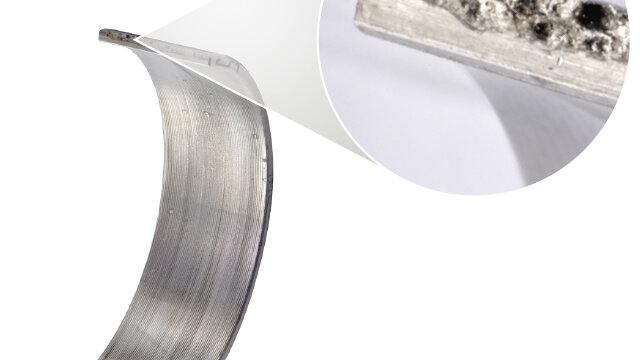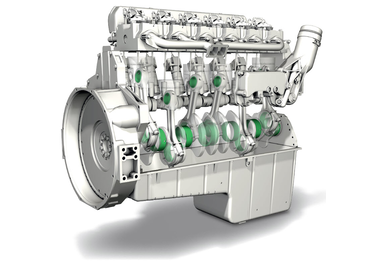
Damage to engine bearing: Corrosion
Information on diagnostics
Is the rear of the engine bearing rough and scarred? Is it frictional corrosion? Can chemical corrosion on the engine bearings only be identified by a rough and porous sliding surface or are there other signs? If one of the two engine bearing damage types is present: Do the bearing shell and the bearing block have to be replaced in this case? Find out all you need to know about this topic here.
Frictional corrosion/Contact corrosion
Description
- Scarred surface of the back of the bearing or in the area of the parting face
- Roughened, matte areas
Lower main bearing shell
Steel-aluminium composite
In the area of the parting face, signs of movement of the bearing shell in the form of frictional corrosion may also be visible. The material surface has clearly changed.
Upper main bearing shells
Steel-aluminium composite
Clear traces of frictional corrosion can be recognised – in part with areas of torn-out material (Fig. left).
Here, the clear characteristics of surface frictional corrosion are recognisable: with areas of torn-out material and scarring of the surface (Fig. right).
If the bearing shell is not sitting correctly in the bearing block, frictional corrosion is caused due to the resulting relative movement (micro sliding movements). The frictional heat generated by the movement of the bearing cannot be dissipated by the lubricant as in the inside of the bearing, but instead causes local overheating of the steel back. The overheating causes fusing and the scarred surface typical of this. There is a transfer of material between the back of the bearing and the bore. The surrounding medium can penetrate into the surface (which is already roughened and chemically activated) and accelerate the corrosion. Frictional corrosion reduces the integrity of the material, as the formation of micro cracks is facilitated. Fatigue damage with consequences such as cracks or fatigue fractures can be the result.
Possible causes- Insufficient preloading due to bore being too large or bearing shell being too small
- Bearing shell protrusion too small: the protrusion of the bearing shell guarantees the reliable fit through sufficient press fitting
- Housing deformation: for crankcases made from aluminium, the housing and bearing shell can deform differently under the effect of extreme temperatures, whereby the reliable fit of the bearing may no longer be sufficient
- Bending of the crankshaft: the bending of the crankshaft leaves a particular wear pattern on the sliding surface of the bearing
- Insufficiently tightened bolts
- Vibrations from the housing or the crankshaft which cause micro-movements (vibration may also be caused by foreign particles and/or hollow areas)
When the signs of contact corrosion are recognisable, the bearing must be replaced as the integrity may already be reduced.
- Locating hole and bearing shell outer diameter must be within the tolerance range so that the specified bearing clearance can be met
- Protrusion: in order to create the desired press fit for the reliable fit, the bearing shell must have a sufficient protrusion
- Check the locating hole and housing for possible deformation
- Balance crankshaft during installation and check strain on the shaft
- Tighten bolts in accordance with the manufacturer's specifications with regard to tightening torques and the tightening sequence
- Check engine for vibration during operation
Chemical corrosion
Description
- Discolouration of the material surface, mainly in the main load area
- Sliding surface rough and porous
Lower main bearing shell
Steel-aluminium composite
Deposits from corrosion products are visible in the bearing sliding surface, especially pronounced in the centre of the bearing. The deposits appear in the formation of stains. When studied under a microscope, roughening of the bearing sliding surface can be seen in the corroded area.
Chemical corrosion is caused by reactions between the bearing shell and engine oil. Triggers for the chemical reaction are aggressive additives in the oil or oil contamination during operation. The integrity of the material is adversely affected by the chemical attack, meaning that fatigue damage is accelerated, even with low stress.
Possible causes- Wear, cavitation and erosion can assist corrosion since they attack the material surface and activate it chemically
- Formation of acids and metal salts as a result of oil ageing
- Impermissible, aggressive oil additives Aggressive products from combustion (sulphur, hydrogen sulphide)
- Contamination of the oil with water or antifreeze
- High operating temperatures accelerate chemical processes such as oil ageing
Corroded bearings must be replaced.
- Always carry out oil changes in accordance with the manufacturer's instructions
- Only use quality oils free from aggressive additives
- Cool engine sufficiently
